Diagnostic Test
Electrodiagnostic testing
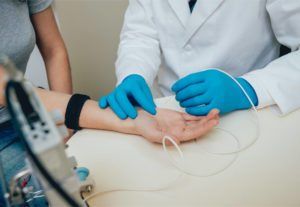 Electrodiagnostic Testing consist of two tests, EMG and NCS, that are often done together to evaluate the health of the neuromuscular system.
Electrodiagnostic Testing consist of two tests, EMG and NCS, that are often done together to evaluate the health of the neuromuscular system.
What is a needle EMG?
- Electromyography (EMG) is a test that measures the electrical activity of the muscle.
- This test evaluates the health condition of the muscles and the nerve cells that control them.
- It is used to help diagnose suspected muscle and nerve disorders.
- Abnormal EMG results usually indicate nerve or muscle damage.
What is a NCS?
- Nerve Conduction Study (NCS) is a test that measures how fast and how strong the electrical activity is in a nerve.
- This test can tell whether a nerve has been damaged.
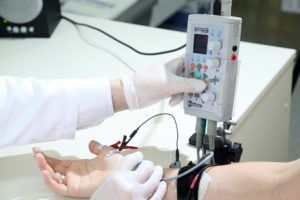
Your doctor may order a Electrodiagnostic test if you are experiencing symptoms that may indicate either a muscle or nerve problem. Some of the more common symptoms include:
- Tingling
- Numbness
- Muscle Weakness
- Muscle Pain
- Radiating Pain
- Involuntary Muscle Twitching
- Paralysis
The results can help your doctor determine the underlying cause of your symptoms.
- Radiculopathies
- Peripheral nerve disorders (i.e. Carpal Tunnel Syndrome)
- Muscle Disorders (i.e. Muscular Dystrophy)
- Motor Neuron Disorders (i.e. Myasthenia Gravis)
- Nerve Disorders (i.e. ALS)
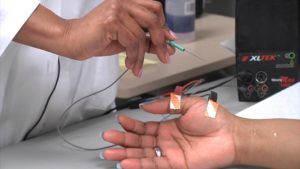 The two tests usually start with the NCS procedure first. It consists with placing small surface electrodes onto the skin to assess the ability of the motor and sensory nerves to send electoral signals. The second part is the needle EMG. It consists of inserting a needle filament into particular muscles to evaluate the muscle activity during at rest and during a contracted state.
The two tests usually start with the NCS procedure first. It consists with placing small surface electrodes onto the skin to assess the ability of the motor and sensory nerves to send electoral signals. The second part is the needle EMG. It consists of inserting a needle filament into particular muscles to evaluate the muscle activity during at rest and during a contracted state.
How Do I Prepare for Electrodiagnostic Testing?
- Notify the doctor of any medication that you are taking. (prescription and over-the-counter)
- Notify the doctor of any bleeding disorder or health problems that you have or had?
- Notify the doctor if you have a pacemaker or implantable defibrillator.
- Prior to the procedure:
- Avoid smoking for at least three hours before the test
- Take a bath or shower prior to the test to remove any oils from the skin. Do not reapply any lotions or creams after washing.
- Wear comfortable clothing that does not restrict the area that the doctor needs to have access to for the evaluation. You may be asked to change into an exam gown if your clothing is restricting the area.
What are the Risk of an Electrodiagnostic Test?
- The exam is a very low risk procedure for injury.
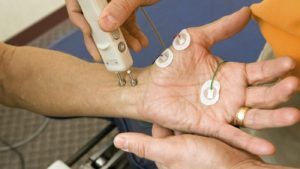
- You may feel sore in the areas that were tested, which will last for a few days. You can take over-the–counter pain relievers such as ibuprofen to control the soreness.
- In rare cases you may experience bruising, swelling and tingling at the needle insertion sites. Tell your doctor if the pain or swelling becomes worse.
The test can take between 45 minutes to 1 ½ hours to perform.
The results will be sent to your doctor and they will review the results with you.
Musculoskeletal Ultrasound
Musculoskeletal Ultrasound (MSKUS) imaging uses sound waves to produce pictures of the muscles, tendons, ligaments and joints.
It is used to help the doctor to diagnose sprains, strains, tears and other soft tissue pathologies.
Ultrasound imaging is very safe, painless noninvasive procedure that does not use ionizing radiation that helps with diagnose and treatments of the condition.
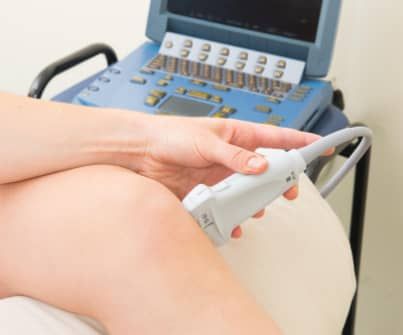 MSKUS are typically used to help diagnose:
MSKUS are typically used to help diagnose:
- Tendon tears or tendinitis
- Muscle tears
- Ligament sprains or tears
- Joint Pathologies
- Fluid collections
- Masses
- Inflammation or fluid within the bursae and joints
- Arthritic changes
- Nerve entrapments
- Tumors
- Cyst
- Foreign bodies in soft tissue
- Hernias
MSKUS can be used for treatments:
- Biofeedback
How should you prepare for MSKUS procedures?
- Wear comfortable and loose-fitting clothing.
- Remove jewelry or clothing that restrikes access to the area to be viewed.
- You may be asked to wear an exam gown during the procedure.
MSKUS examination may take 15 to 30 minutes.
Results will be sent to your doctor after the test has been completed.
